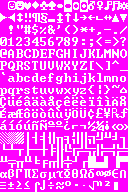- v50 information can now be added to pages in the main namespace. v0.47 information can still be found in the DF2014 namespace. See here for more details on the new versioning policy.
- Use this page to report any issues related to the migration.
Lua scripting

|
Research Pending! This article or section is incomplete/under construction (likely due to recent changes) and may still be outdated or missing details. Feel free to do some testing and expand it. |
| Modding |
|---|
| Tokens |
| Audio · Biome · Graphics · Tile page · Interaction · Mod info · Plant · Speech · Sphere · Syndrome · World |
| Body tokens |
| Body · Body detail plan · Bodygloss · Tissue |
| Creature tokens |
| Creature · Creature mannerism · Personality facet · Creature variation · Procedural graphics layer |
| Descriptor tokens |
| Descriptor color · Color · Descriptor pattern · Descriptor shape |
| Entity tokens |
| Entity · Ethic · Language · Value · Position |
| Job tokens |
| Building · Labor · Reaction · Skill · Unit type |
| Item tokens |
| Item type · Item definition · Ammo · Armor · Instrument · Tool · Trap component · Weapon |
| Material tokens |
| Material type · Material definition · Inorganic material definition |
|
Lua |
| Scripting · Examples · Functions |
This article is about procedural raw generation. Information on Utility:DFHack scripting can be found at https://docs.dfhack.org/en/stable/.
Lua scripting is an experimental featurev51.06. It is used to create custom procedurally-generated objects that were previously created by hardcoded methods. It was announced in a video, with the stated goal of "supporting future magical endeavors."
Inorganic materials, languages, creatures, interactions, items (currently excluding instruments), reactions, entities, and plants are open to this system.
Scripts are loaded from a mod's scripts/init.lua file, as well as from any included files.
Code Samples
Divine language
This is the divine language, which generates a bunch of random-sounding words from a set of syllables.
languages.GEN_DIVINE=function()
local letters={}
letters.vowel={}
letters.cons={}
letters.vowel.COMMON_NUM=5
letters.vowel.NUM=35
letters.cons.COMMON_NUM=12
letters.cons.NUM=22
letters.vowel.lookup={
"a","e","i","o","u",
"ae","ai","ao","au","ea","ei","eo","eu","ia","ie","io","iu","oa","oe","oi","ou","ua","ue","ui","uo","ah","eh","ih","oh","uh","ay","ey","iy","oy","uy"
}
letters.cons.lookup={
"b","p","g","k","c","z","s","d","t","m","n","ng",
"v","f","w","h","j","l","r","q","x","y"
}
for k,v in pairs(letters) do
v.common={}
v.rare={}
for i=1,5 do
if trandom(5)~=0 then v.common[i]=v.lookup[trandom(v.COMMON_NUM)+1] else v.common[i]=v.lookup[trandom(v.NUM)+1] end
end
for i=1,15 do
v.rare[i]=v.lookup[trandom(v.NUM)+1]
end
end
local function letter(t)
if trandom(5)~=0 then
return pick_random(t.common)
else
return pick_random(t.rare)
end
end
local gen_divine={}
for k,v in ipairs(world.language.word) do
local str=""
if trandom(2)~=0 then
str=str..letter(letters.cons)
str=str..letter(letters.vowel)
else
str=str..letter(letters.vowel)
end
local num_letters=trandom(3)
str=str..letter(letters.cons)
if num_letters>0 then str=str..letter(letters.vowel) end
if num_letters>1 then str=str..letter(letters.cons) end
gen_divine[v.token]=str
end
return gen_divine
end
Identity language
This makes a language called GEN_IDENTITY which is like "Abbey abbeyabbeys the abbey of abbeys" - i.e. it's the "English" language you might see occasionally.
| [show][Select all] GEN_IDENTITY |
|---|
New divine metal
You can add new metal descriptions for divine metal pretty easily, for example:
| [show][Select all] Laughing metal |
|---|
New forgotten beast
Add a new kind of forgotten beast.
| [show][Select all] Unbidden spirit |
|---|
Remove default forgotten beast
creatures.fb.default=nil
Adamantine alloys
You can add your own arbitrary generated objects, though as of right now there's no way to make settings for them. This allows for some truly wild stuff; here's a fun example: adamantine-metal alloys for every single non-special metal, giving you an average of the properties of them.
| [show][Select all] Adamantine alloys |
|---|
